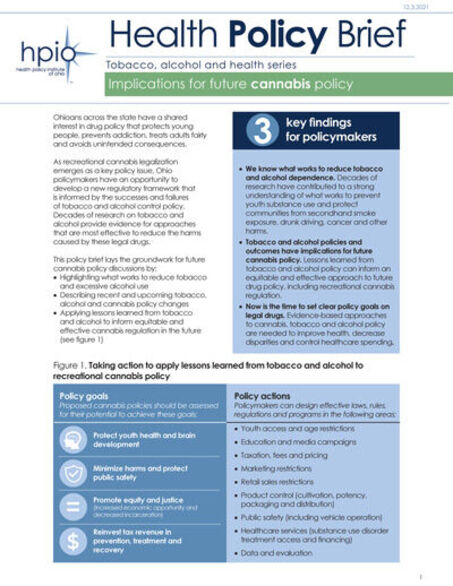12 Pages •
Read Time 20 Minutes
Tobacco, alcohol and health series:
Implications for future cannabis policy
As recreational cannabis legalization emerges as a key policy issue, Ohio policymakers have an opportunity to develop a new regulatory framework that is informed by the successes and failures of tobacco and alcohol control policy.
Decades of research on tobacco and alcohol provide evidence for approaches that are most effective to reduce the harms caused by these legal drugs. This policy brief lays the groundwork for future cannabis policy discussions by:
- Highlighting what works to reduce tobacco and excessive alcohol use
- Describing recent and upcoming tobacco, alcohol and cannabis policy changes
- Applying lessons learned from tobacco and alcohol to inform equitable and effective cannabis regulation in the future
3 Key findings for policymakers
- We know what works to reduce tobacco and alcohol dependence. Decades of research have contributed to a strong understanding of what works to prevent youth substance use and protect communities from secondhand smoke exposure, drunk driving, cancer and other harms.
- Tobacco and alcohol policies and outcomes have implications for future cannabis policy. Lessons learned from tobacco and alcohol policy can inform an equitable and effective approach to future drug policy, including recreational cannabis regulation.
- Now is the time to set clear policy goals on legal drugs. Evidence-based approaches to cannabis, tobacco and alcohol policy are needed to improve health, decrease disparities and control healthcare spending.
More resources
Other material from the Tobacco, Alcohol and Health series:
- Policy considerations: Cannabis regulation in Ohio
- Facts & Figures (PowerPoint data graphics from the report for public use)
- Health Impacts of Tobacco Use in Ohio
- Health Impacts of Excessive Alcohol Use in Ohio
- Sector Roles to Reduce the Harms of Tobacco, Alcohol and Cannabis Use
- What Works to Reduce Tobacco and Excessive Alcohol Use
By:
Hailey Akah, JD, MA
Amy Bush Stevens, MSW, MPH
Stephen Listisen, MPA
Bekah Sutter, MPH candidate
Jacob Santiago, MSW
Published On
December 3, 2021
Table of Contents
 Download Publication
Download Publication
